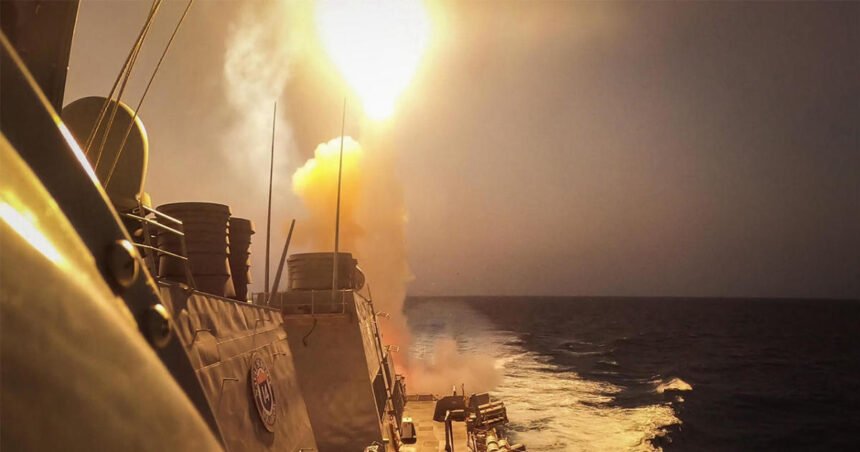In May the destroyer USS Carney returned home to Mayport, Florida, at the end of a seven-month voyage to the Middle East – a voyage unlike any other. For Commander Jeremy Robertson and his crew, the war between Israel and Hamas turned a routine deployment into a running gun battle against Iranian-backed Houthi rebels in Yemen.
It began soon after the ship passed through the Suez Canal into the Red Sea. "We started getting indications that there was possibly some sort of attack coming from the south towards Israel," said Lt. Dennis Morral.
The Houthis had come in on the side of Hamas and were launching a stream of cruise missiles and drones (also known as unmanned aerial vehicles, or UAVs) toward Israel. "I think it was anywhere from 25 to 35 UAVs and land attack cruise missiles had been launched, and some of them were headed up the Red Sea," said Robertson. "We picked up the very first one-way attack UAV on our system approximately 60 or 70 miles away from us."
Robertson headed for the ship's Combat Information Center: "I came down to Combat sometime around 5:00, 5:30 in the afternoon, and didn't leave until about 2 a.m.," he said.
The Carney tracked and intercepted drones and missiles that came within range – the first American shots fired in defense of Israel. "Whether or not they would have actually made it to Israel is unknown," Robertson said, "but they certainly were a long way from home, and there were certainly a lot of them."
The Carney fired on more than 15 targets.
Martin asked, "Had any U.S. Navy ship ever fought a battle like that?"
"Not since World War II," Robertson replied. "It's been a really long time."
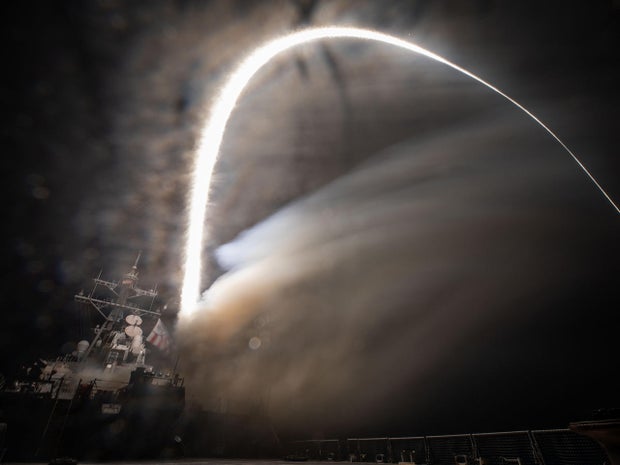
Lt. Cdr. Rebekah Fleming, who is in charge of all the systems that come together in the Combat Information Center, said, "It was intense. As soon as it was time for the real deal, I couldn't say anybody was shocked, because we trained to it, but it was surreal."
The battle lasted nine hours. Then, Robertson said, "It just kind of stopped, and we stood around and kind of looked at each other like, 'Wow, did that really just happen?'"
The Carney doesn't look heavily armed – just a single gun mount visible on its forward deck. But Lt. Kenny Shook, the ship's weapons officer, showed "Sunday Morning" the launch tubes which hold its real firepower. "Once we give the order in combat, the cell hatch is going to open and the missile's going to go out and take out the target," Shook said.
During its time in the Red Sea, the Carney shot down 45 out of 50 slow-flying drones and faster flying missiles (ballistic and cruise) that were targeting commercial ships transiting to and from the Suez Canal.
Robertson said the ballistic missiles worried him the most: "You're looking at something that's coming at you at Mach 5, Mach 6. The watch standers have anywhere from 15 to 30 seconds to engage."
It was the Navy's first-ever real-world test against a supersonic missile. "The computer is spitting out where it's going and the altitude and all that very fast, of course," Robertson said, "but the humans have to push the buttons."
Before any buttons got pushed, the captain had to determine if the computer was tracking a legitimate target in a part of the world crisscrossed by commercial airliners.
Here's what the air space looked like that night:
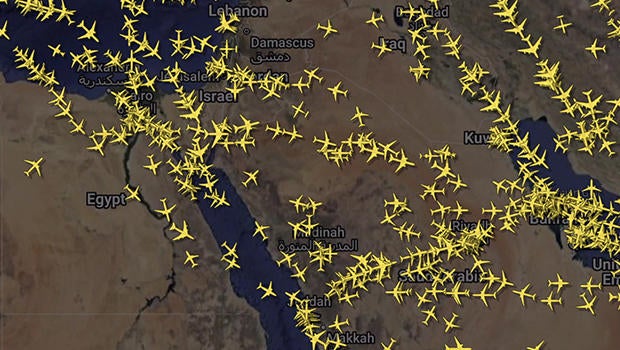
"Obviously, I'm very concerned about shooting down the wrong thing," Robertson said.
The Carney would break away to refuel and replenish its stores at sea, but had to go into port to pick up more missiles, which are too big to be transferred underway.
It was firing million-dollar missiles at thousand-dollar drones. Robertson says no one encouraged him to use fewer missiles: "Not once. I'm entrusted with this $2 billion asset and 300-plus lives, and so the cost-benefit analysis to me shooting a missile is absolutely in my wheelhouse, and I'll do it all day and twice on Sunday."
The Carney also fired its main gun, but it has a much shorter range, and Robertson was determined to keep the Houthi drones and missiles as far away as possible. "We never had anything come even remotely close," he said, close being inside of five miles.
But the Carney and the other Navy ships patrolling the Red Sea could not protect every commercial ship from Houthi attacks. One vessel sank.
The Defense Intelligence Agency plotted the successful attacks over a four-month period:
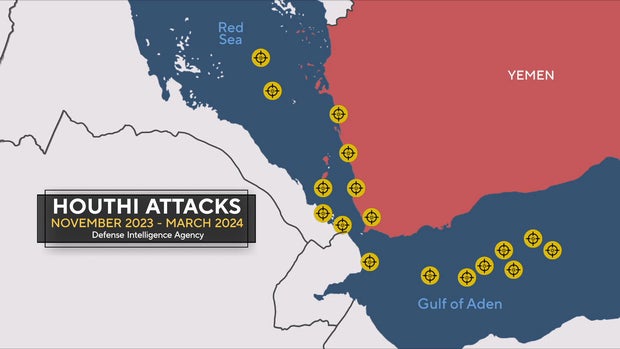
By the time the Carney headed home, the Red Sea was still not safe – and the destroyer's battles still not over. "We got recalled," Robertson said, "and we were back underway and headed over to the Eastern Mediterranean."
On the night of April 14, Iran launched more than 300 drones and missiles against Israel. The voyage of the Carney ended as it began, shooting down an incoming missile. "We fired in defense of Israel," Robertson said.
The last shot Carney fired before heading home, its battle flag flying and its crew forever changed.
At Mayport one young crewmember told reporters, "I left as a different person. And I came back as a stronger person. I think I'll be able to live with that the rest of my life."
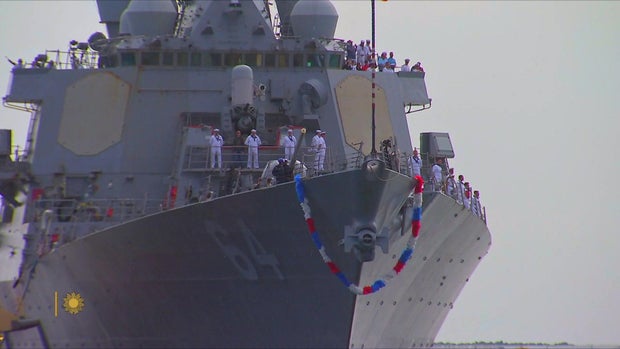
For more info:
Story produced by Mary Walsh. Editor: Mike Levine.
David Martin has been CBS News' national security correspondent, covering the Pentagon and the State Department, since 1993.
More from CBS News
Book excerpt: Marines look back on Iraq War 20 years later in "Battle Scars"
Iran's presidential election goes to runoff after low voter turnout
This week on "Sunday Morning" (June 30)
Iranians vote in a presidential election marked by widespread apathy


